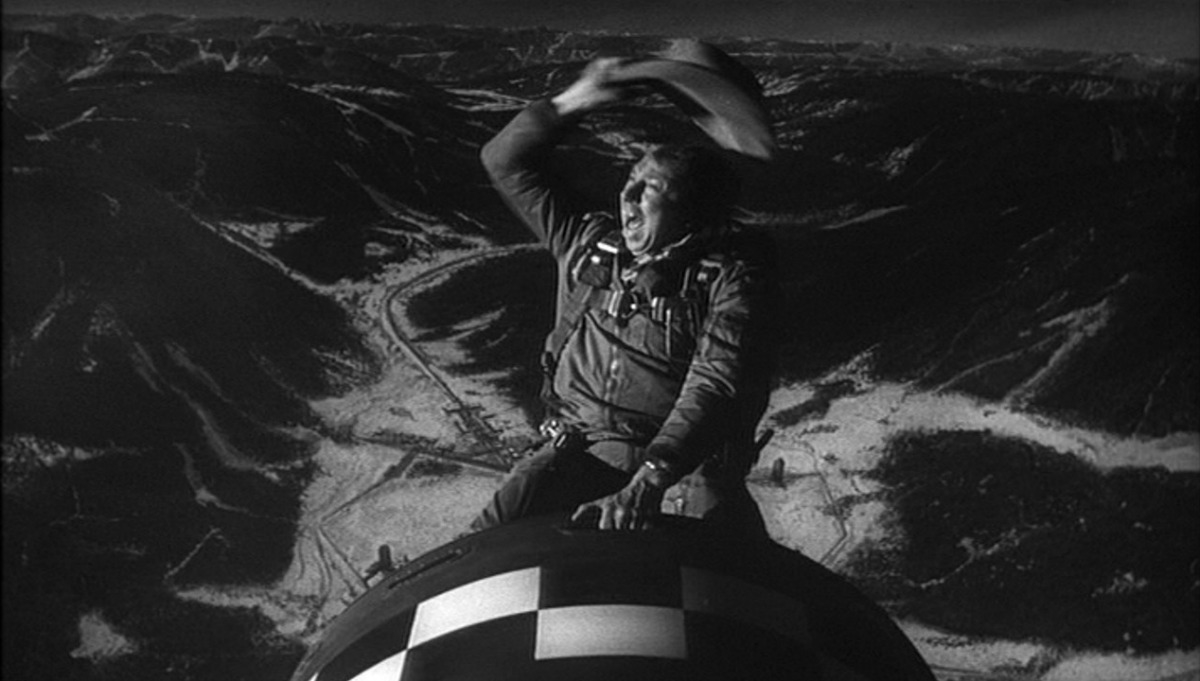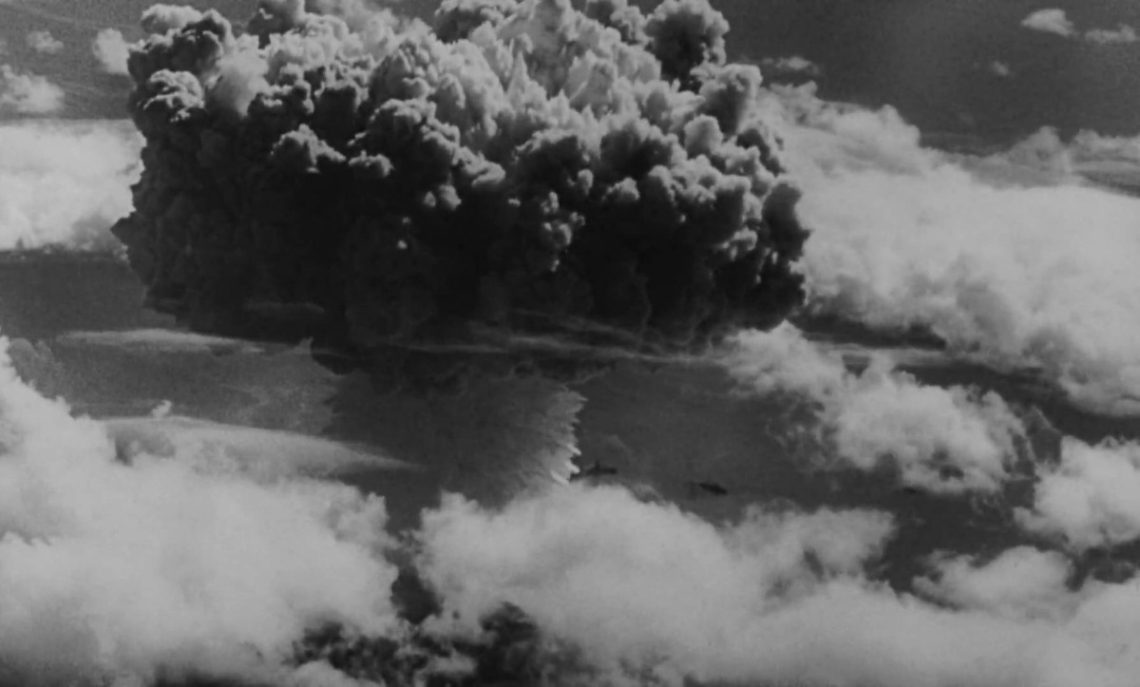Vera Lynn wasn’t in the first draft. The “We’ll Meet Again”-scored montage of blooming atomic explosions that closes out Stanley Kubrick’s flawless Cold War comedy Dr. Strangelove, or: How I Learned to Stop Worrying and Love the Bomb (out today in a new Criterion Collection edition) took the place of a cream-pie bukkake in the War Room, with Army officials and undercover Commies clownishly hurling desserts at one another until everyone was indistinguishable — cue subtext. Kubrick shot the sequence but ultimately opted to ditch it in the editing suite, citing issues of not-quite-rightness. He’d later tell writer Joseph Gelmis in an interview for his book The Film Director as Superstar, “I decided it was farce and not consistent with the satiric tone of the rest of the film.”
This would seem to be pretty big talk coming from a guy who had dutifully packed his film to the point of turgidity with bluish double entendres, but Kubrick was completely right. A cream-pie massacre crosses a line into full-on silliness, and in this ever-so-slightly alternate universe, dick jokes are deadly serious business. By playing the bountiful sexual innuendos in the film as straight as possible, Kubrick underscored the harebrained hypocrisy and absurdity of war, and what’s more, effectively presaged the atmosphere of normalized insanity that is life in the year 2016. When the world’s gone completely mad, telling who’s joking apart from who’s being sincere is an impossible task.
Sex is everything in Dr. Strangelove and everything is sex. The driving need to put one’s genitals in and/or around the genitals of others doesn’t just guide the plot, but permeates the fabric of the film itself. Kubrick superimposes his credit sequence over archival footage of an aircraft linking up to a fuel tanker while aloft, with the plane receiving the phallic hose to the melody of “Try a Little Tenderness.” One funky bass line away from full-on mechanical pornography, the brief sequence succinctly introduces Kubrick’s inflammatory conflation of armed conflict with doin’ it, and sets a tone juxtaposing the sophomoric with the serious. Cinema has historically treated war as a vast, complex, even elemental force that sweeps through nations like a manmade plague; to the horndog generals calling the shots, however, it’s as basic as “square peg meets square hole.”

When Dr. Strangelove premiered to an audience still uneasy because of nuclear tensions with the USSR, it “bit them right on the sensibilities,” to crib a quote from critic Ty Burr. For his detractors, Kubrick’s willingness to trivialize something as grave as the impending atomic apocalypse went beyond poor taste into low-level treason. Wasn’t humor supposed to provide audiences with comfort and security in the face of danger, not snigger impishly while confirming all of our worst fears? How could this smartass — a Brit, no less! — deign to crack wise about pubic-hair wigs while we could all be blown to hell at any second? (For the record, Merkin Muffley — the name of the U.S. president Peter Sellers plays in the film, one of three roles he takes on — remains the greatest funny name this side of Duck Soup’s Rufus T. Firefly.) Fifty years’ worth of history, however, has vindicated Kubrick’s blithe irreverence. As the egos of violent men threw the very fate of Earth into jeopardy, there was no better time for a rogue general to plunge America into World War III over a misdiagnosed case of erectile dysfunction.
That’s the cruelest, funniest joke in Dr. Strangelove, of course: that existence itself all hinges on the flaccid penis of delusional military man Jack D. Ripper (Sterling Hayden). Convinced that his, ahem, “loss of essence” could only be the result of a Red fluoridation plot, Ripper uses the failsafes in place to ensure that no one man can abuse the U.S. nuclear arsenal — all just so that no one will stop him from doing just that. And while there are fleeting moments where Kubrick verges on out-and-out schtick — General Buck Turgidson (George C. Scott) taking a stunned pratfall after President Muffley suggests bringing a Russian official into the War Room, for one, or a Coca-Cola machine ejaculating into Colonel ‘Bat’ Guano’s (Keenan Wynn) face during a high-pressure situation — his steadfast deadpan is the fuel that makes the film’s satirical ambitions go. The joke, and what a gloriously sick joke it is, only works if Strangelove and everyone in it can maintain their composure.
The film’s most celebrated sequence, in which redneck pilot Major ‘King’ Kong (Slim Pickens) ecstatically straddles a warhead and rides it to the ground in orgasmic bliss, marks a decisive shift in the script and cuts to the essence of Kubrick’s comedic apparatus. The detonation of his gargantuan stand-in phallus immediately changes the bar for what is and is not acceptable behavior back in the War Room, creating a new status quo under which hilariously unrealistic ideas are suddenly rendered terrifyingly plausible. Kubrick keenly observes how times of desperation cause people to fall susceptible to charlatans and madmen such as the good Herr Doktor himself, and then completely erases the line between “a batshit crazy idea” and “just batshit crazy enough to work.” When Dr. Strangelove (Peter Sellers’ third character after Muffley and Group Capt. Lionel Mandrake, Gen. Ripper’s executive officer) first begins voicing his principles of mutually assured destruction and a possible “doomsday device,” the characters present in the War Room have their skepticism, with Turgidson in particular dubious of the former Nazi’s methods. But all it takes to change his tune is a little bit of fear, and Strangelove has the good sense to tell the military higher-ups precisely what they want to hear. Knowing that their brains are located primarily inside of their scrotums, Strangelove paints them a sexy portrait of post-apocalyptic dystopia, where “prodigious” breeding rates would guarantee both a future for the human race and a steady stable of the most attractive women for the men. (When Strangelove suggests a necessary ratio of “10 females to each male,” light bulbs turn on behind the eyes of every man in the room.) That men are only as civil and rational as a given situation demands of them ranks as the most disquieting suggestion in this pitch-black critique; as soon as the chips are down, the most laughable ideas get revisited as viable possibilities.

All of this is to say that if Donald Trump did not exist, surely Kubrick would have had to create him. Indeed, Trump’s obsession with his image and masculine pride, exemplified most deliciously through his continued apoplexy over well-founded accusations of tiny-handedness, would make him right at home in the loony dimension of this film. The public execution of decency that has been the 2016 Presidential election cycle thus far could have very well been modeled after deleted scenes from Strangelove, a harrowing real-life illustration of the ease with which Americans drop their standards on who and what can be considered legitimate. Trump seized power at a juncture of great uncertainty and capitalized on an apparent need for security over all else in the average citizen. Over time, the media and general public has shown a willingness to engage with policies from Trump that would’ve gotten him laughed out of Senate chambers mere months before, as if the threshold for political discourse has now reached the “no bad ideas in brainstorming” phase. By the point that a man can reassure the American people about the size and functionality of his penis during a debate for the candidacy of President, the distinction between real life and a comedically outsized version of the same has either vanished or ceased to be of use to us.
Dr. Strangelove was ahead of its time even before we started living in it. It wasn’t the first work of great political satire ever committed to celluloid, but to this day, it might still be the most potently subversive. Kubrick’s sexual shenanigans offered laughing as the only acceptable alternative to crying and, in doing so, reminded us how razor-thin the line between those two is. A man who suggests America devolve into a subterranean tribe driven by polyamorous sexual commerce is a maniac, but a man presenting that same idea in an atmosphere of fear and insecurity is simply thinking outside the box. As with the best comedy, it all comes down to the timing.


















One thought on ““Strangelove’s” Searing, Scathing, Satirical Sexual Shenanigans”
Kubrick wasn’t British. He was an American who moved to the UK (sometime after making Strangelove, if memory serves).